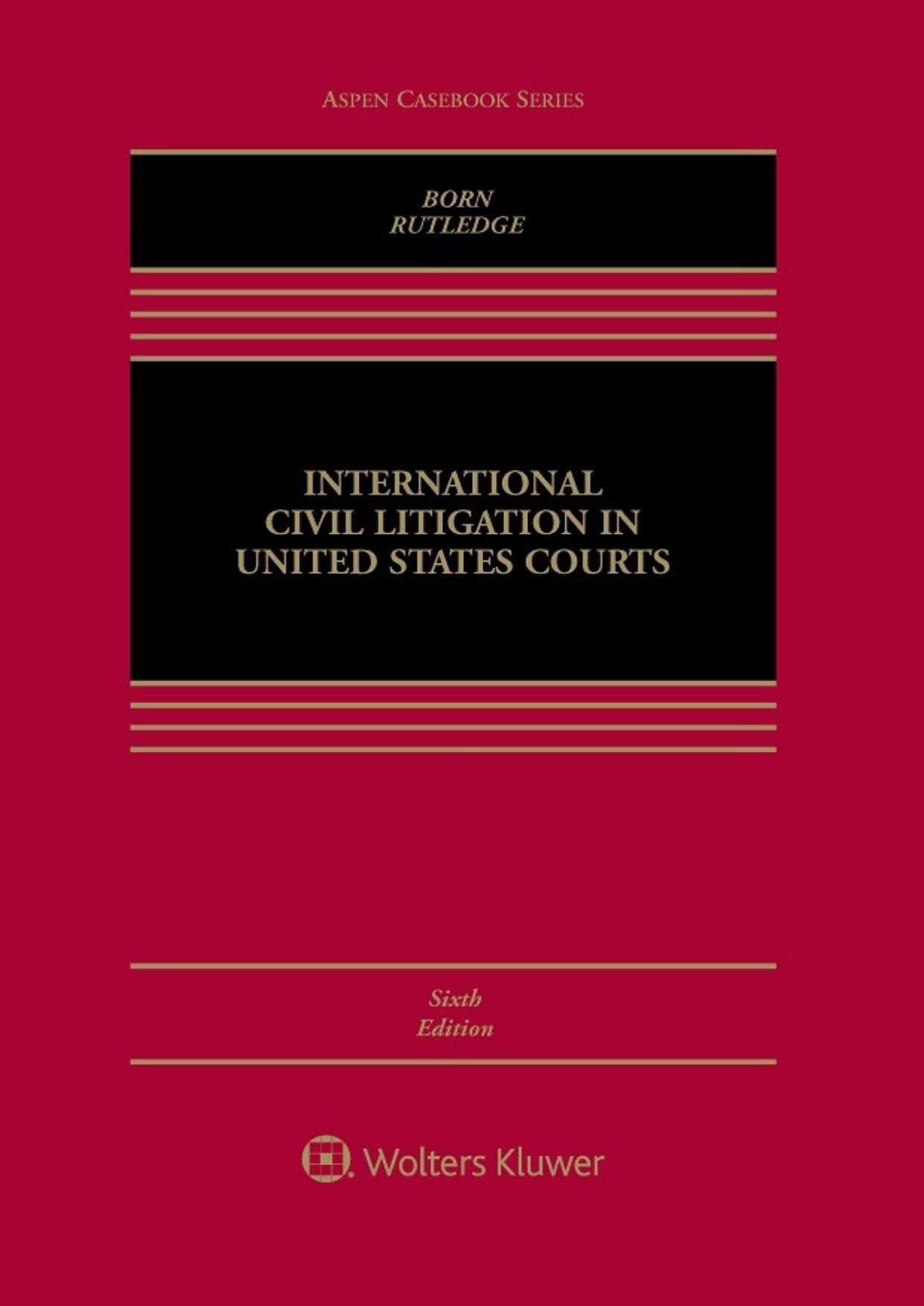International Civil Litigation in United States Courts 7th Edition by Gary Born, Peter Rutledge ISBN 9781543847437 1543847439
$70.00 Original price was: $70.00.$35.00Current price is: $35.00.
Instant download International Civil Litigation in United States Courts (Aspen Casebook Series) Gary B. Born & Peter B. Rutledge after payment
International Civil Litigation in United States Courts 7th Edition by Gary Born, Peter Rutledge – Ebook PDF Instant Download/Delivery: 9781543847437, 1543847439
Full dowload International Civil Litigation in United States Courts 7th Edition after payment

Product details:
ISBN 10: 1543847439
ISBN 13: 9781543847437
Author: Gary B. Born; Peter B. Rutledge
International Civil Litigation in United States Courts
International Civil Litigation in United States Courts 7th Table of contents:
-
PART 1 – JUDICIAL JURISDICTION
Chapter 1: Jurisdiction of U.S. Courts over Subject Matter in International Disputes
A. Introduction
- Plenary State Subject Matter and Legislative Jurisdiction: Overview of the scope of state and federal legislative authority under the U.S. Constitution.
- Limited Federal Legislative and Subject Matter Jurisdiction: Focuses on the limitations imposed by Article I and Article III of the Constitution on federal legislative and judicial authority.
B. Alienage Jurisdiction of Federal Courts
- Introduction and Historical Background: The role of alienage jurisdiction, where federal courts have jurisdiction over cases involving foreign parties.
- Statutory Grants of Alienage Jurisdiction: Detailed discussion of statutory provisions such as 28 U.S.C. §§ 1332(a)(2) and 1332(a)(3).
- Key Case Law: Includes Hercules Inc. v. Dynamic Export Corp. and discussion of the evolution of alienage jurisdiction.
C. Federal Question Jurisdiction in International Cases
- Introduction and Historical Background: Overview of the federal question jurisdiction granted under Article III and various statutes.
- Alien Tort Statute (ATS): A look at the ATS and its application in cases like Filartiga v. Pena-Irala, Sosa v. Alvarez-Machain, and Kiobel v. Royal Dutch Petroleum.
- Federal Common Law and International Law: The relationship between federal jurisdiction and customary international law in matters of international disputes.
Chapter 2: Jurisdiction of U.S. Courts over Parties to International Disputes
A. Introduction and Historical Background
- Statutory and Constitutional Requirements for Personal Jurisdiction: The evolving standards for personal jurisdiction over foreign defendants, including state and federal long-arm statutes, and due process limits.
- Key Cases on Personal Jurisdiction: Detailed analysis of landmark cases, such as Pennoyer v. Neff, International Shoe, World-Wide Volkswagen, and the evolving tests of minimum contacts and purposeful availment.
B. General Jurisdiction of U.S. Courts in International Cases
- General Jurisdiction: The concept that a defendant may be subject to jurisdiction in a forum where they are domiciled or incorporated (e.g., Daimler AG v. Bauman).
- Consent or Waiver: Jurisdiction through prorogation agreements, implied submissions, or presence within the forum (e.g., C.S.B. Commodities, Inc. v. Urban Trends (HK) Ltd.).
C. Specific Jurisdiction of U.S. Courts over Foreign Defendants
- Product Liability and Tort Cases: Jurisdiction over foreign defendants in cases related to product liability and torts, with discussions of purposeful contacts and reasonableness (e.g., Asahi Metal Industry Co. v. Superior Ct. of Cal. and J. McIntyre Machinery, Ltd. v. Nicastro).
- Contract Disputes: How U.S. courts handle personal jurisdiction in international contract disputes (e.g., Afram Export Corp. v. Metallurgiki Halyps, SA).
D. Jurisdiction Based on Corporate Affiliations or Agency Relationships
- Alter Ego Status and Agency: Jurisdiction based on corporate affiliations, alter ego status, and agency relationships (e.g., Frummer v. Hilton Hotels).
E. Personal Jurisdiction in Federal Courts
- Federal Rules and Due Process: The application of Federal Rule of Civil Procedure 4, the limits on personal jurisdiction, and the necessity for statutory authorization.
Chapter 3: Foreign Sovereign Immunity and Jurisdiction of U.S. Courts over Foreign States
A. Introduction
- Historical Background and the Foreign Sovereign Immunities Act (FSIA): Overview of the FSIA of 1976, which governs the immunity of foreign states from U.S. jurisdiction.
- International Recognition of the Restrictive Theory of Sovereign Immunity: The shift from absolute to restrictive immunity in international law.
B. Entities Entitled to Immunity Under the FSIA
- Foreign States and Political Subdivisions: Jurisdictional immunity granted to foreign states, political subdivisions, and agencies/instrumentalities of foreign states.
- Foreign Heads of State and State Officials: The question of whether heads of state or government officials enjoy immunity from jurisdiction.
C. Bases for Judicial Jurisdiction over Foreign States Under the FSIA
-
Commercial Activity with a U.S. Nexus: Jurisdictional rules when a foreign state engages in commercial activity that affects the U.S. (e.g., Republic of Argentina v. Weltover, Inc.).
-
Noncommercial Torts: Jurisdiction over foreign states in cases involving noncommercial torts committed within the U.S. (e.g., In re SEDCO, Inc. and Letelier v. Republic of Chile).
-
Waiver of Sovereign Immunity: Circumstances under which foreign states waive their immunity from jurisdiction, including cases like Verlinden BV v. Central Bank of Nigeria and Cargill Int’l, S.A. v. M/T Pavel Dybenko.
-
Terrorism-Related Acts: The jurisdictional rules that apply when acts of terrorism are involved, such as in Price v. Socialist People’s Libyan Arab Jamahiriya.
PART 2: CHOICE OF FORUM
-
Chapter 4: Forum Non Conveniens in International Litigation
- Explores the doctrine of forum non conveniens in the context of international cases, including its common law origins, basic principles, and modern applications.
- Discusses the private and public interest factors used in determining forum appropriateness, the deference to a plaintiff’s choice, and the adequate alternative forum requirement.
- Also examines the contemporary role of this doctrine, particularly in relation to U.S. courts and the Erie Doctrine.
-
Chapter 5: International Forum Selection Agreements
- Focuses on forum selection clauses in international contracts, including their enforceability and grounds for resisting enforcement.
- Examines the historical and modern legal frameworks governing forum selection agreements, including key cases and international conventions.
- Considers public policy exceptions and applicable law when enforcing these agreements in U.S. courts.
-
Chapter 6: Parallel Proceedings: Lis Alibi Pendens and Antisuit Injunctions
- Discusses the issue of parallel proceedings in multiple jurisdictions, covering doctrines such as lis alibi pendens and the use of antisuit injunctions.
- Reviews the standards for issuing antisuit injunctions and how courts balance competing jurisdictions.
PART 3: LEGISLATIVE JURISDICTION AND CHOICE OF LAW
-
Chapter 7: Legislative Jurisdiction
- Covers the limits of U.S. legislative jurisdiction under international law, including the effects test and the relationship between U.S. federal and state law.
- Examines constitutional limits on the U.S. government’s jurisdiction, with case studies on legislative reach beyond territorial borders.
-
Chapter 8: Choice of Law in International Litigation
- Addresses how U.S. courts choose the applicable law in international cases, focusing on the extraterritorial application of federal statutes (e.g., antitrust and securities law) and torts.
- Discusses the evolution of choice-of-law principles, such as the “most significant relationship” standard, and the role of party autonomy in contracts.
- Covers the Erie Doctrine and how U.S. courts apply state choice-of-law rules in federal diversity actions.
-
Chapter 9: Act of State and Foreign Sovereign Compulsion
- Examines the Act of State doctrine, which prevents U.S. courts from reviewing foreign sovereign acts.
- Discusses exceptions to this doctrine, including the Bernstein exception, the commercial exception, and the Second Hickenlooper Amendment.
- Reviews the Foreign Sovereign Compulsion doctrine that shields defendants from liability if they were compelled by a foreign government.
Part 4 – International Judicial Assistance
Chapter 10: Service of U.S. Process on Foreign Persons
- A. Introduction and Historical Background
- Choice of Law and historical context of service of process.
- B. Contemporary U.S. Rules Governing Service of Process on Foreign Defendants
- 1. Federal Court Proceedings
- Service of Complaint and Summons (Rule 4, Federal Rules of Civil Procedure)
- Jurisdictional requirements, tolling of statutes, and notice.
- 2. Mechanisms for Serving Foreign Defendants in the U.S.
- 3. Service of Process Abroad
- Old and current Federal Rules on service abroad, including Rule 4(f).
- 4. Waivers of Service
- Under Rule 4(d).
- 5. State Court Service
- Differences in state procedures.
- 6. Due Process Considerations
- Reasonable notice requirements for foreign service.
- 1. Federal Court Proceedings
- C. Service of Process in Foreign Legal Systems
- Rules governing foreign courts, restrictions on service, and letters rogatory.
- D. Service of U.S. Process Abroad: Selected Issues
- Analysis of U.S. process served abroad, challenges with foreign law, and relevant cases (e.g., Commodity Futures Trading Commission v. Nahas).
- E. Hague Service Convention
- The role of the Hague Service Convention, its purposes, scope, and mechanisms.
- F. Service on Foreign States
- Foreign Sovereign Immunities Act (FSIA) rules for service on foreign states and agencies.
- G. Service of Foreign Process in the U.S.
- Legal considerations and recognition of foreign judgments, including statutory provisions (Sections 1696, 1781).
Chapter 11: Extraterritorial Discovery and Taking Evidence Abroad
- A. U.S. Discovery Abroad
- Overview of U.S. discovery practices for materials located abroad.
- B. Foreign Reactions to U.S. Discovery
- Impact of foreign blocking statutes and diplomatic objections.
- C. Direct U.S. Discovery from Parties Abroad
- Discovery from parties by deposition, including standards for foreign depositions.
- Judicial power in ordering discovery and related cases (e.g., Uranium Antitrust Litigation).
- D. Conflicts Between U.S. Discovery Orders and Foreign Law
- Resolving conflicts where U.S. orders violate foreign law, including judicial power and case law (e.g., Société Internationale v. Rogers).
- E. Hague Evidence Convention
- Mechanisms under the Hague Evidence Convention, including Central Authority and alternative methods.
- F. Taking Evidence in the U.S. for Foreign Proceedings
- Legal processes for evidence gathering in the U.S. for foreign legal matters.
Chapter 12: Recognition and Enforcement of Foreign Judgments
- A. Introduction
- Distinction between recognition and enforcement, Full Faith and Credit Clause for sister state judgments.
- B. Recognition and Enforcement by U.S. Courts
- No federal law on recognition of foreign judgments, but state practices and principles (e.g., Hilton v. Guyot).
- Reciprocity and comity considerations.
- The Uniform Foreign Money Judgments Recognition Act.
- C. Exceptions to Recognition
- Adequate notice, jurisdictional issues, public policy, and fairness of foreign judicial systems.
- D. The Revenue Rule
- Issues with recognition of foreign tax judgments.
- E. Applicable Law and the Erie Doctrine
- Case law addressing Erie and recognition issues in foreign judgments.
Chapter 13: International Commercial Arbitration and U.S. Courts: An Overview
- A. Overview of International Arbitration
- Legal framework and key instruments, including the New York Convention and U.S. legislation.
- B. Validity and Enforceability of Arbitration Agreements
- Historical background, separability, and enforceability under the New York Convention and FAA.
- Judicial challenges to arbitration agreements (e.g., Mitsubishi Motors v. Soler).
- C. Recognition and Enforcement of Arbitral Awards
- Mechanisms for enforcement of international arbitral awards under the New York Convention.
- Case law, such as Parsons & Whittemore and Northrop Corp. v. Triad International.
- D. Professional Responsibility in International Arbitration
- Ethical considerations, including relevant case law and legislative materials (e.g., Williamson v. John D. Quinn Construction Co.).
People also search for International Civil Litigation in United States Courts 7th:
examples of civil litigations
do federal courts hear civil cases
examples of civil law cases
international civil law
international civil court


